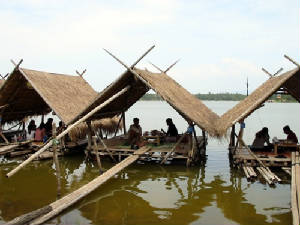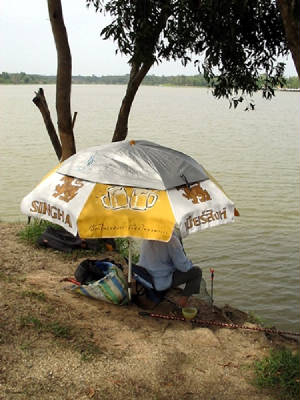|
Fresh
air and pollution-free environment are hard to find in the city like Chiangmai,
while several modern air-conditioned shopping malls are fast turning recreation
centers. But people still need to get close to nature even if it’s for a short
time.
After a hard week’s work, I was
thinking about a place to go and relax for a day. A friend recommended me a
popular weekend recreation by a big lake where I could enjoy nature and cool
breeze.
“Huay Tueng Tao”is a very large
man-made lake and public-park whose development was inspired by His Majesty the
King following his visited to Chiang Mai in 1980. Conceived as an eco-tourism
project, the reservoir contains 1.4 cubic meters of water and is managed by the
33rd Military Circle.
There
wasn’t much traffic this
Sunday as we travelled northwest of Chiang Mai city past the sports complex and
Sri Nakarintra Hospital College on Klong
Chonprathan Road on the way to Mae Rim.
We
kept looking for road signs and
were a bit worried because we didn’t see any until we reached the bar-bridge,
and that gave us a great sense of relief. It road sign was written in Thai and
English, and thereafter the drive was a breeze
I followed
the unpaved road lined
with big eucalyptus trees until we reached the park gate and then stopped to
pay the entrance fee and make enquiries. The park seemed a perfect place for
exercise and recreation. It had an asphalt-jogging track three meters wide and five
kilometers long plus a cycling track for mountain bikers to pedal up and down
hill. We were told it was the Thailand’s
longest mountain biking track.

The
admission fee is 10 baht for adults and 5 baht for children. There is no public
transport to the lake so a charter or hire transport service is the best way to
get there if you are not driving down on your own.
Driving into
the park I was amazed
by the size of the reservoir; it was much larger than I had expected. The
layout was very impressive. You could swim in the lake, rent pedal boats and
canoes, fish, eat and relax in extremely pleasant settings.
We
drove along the curved route
around the hill from the entrance to the viewpoint on the western side of the
lake close to Doi Suthep mountain ridge. From this vantage-point the landscape
looked absolutely superb; you get a panoramic view of the lake surrounded by
rolling mountains.
A boy invited me to sit in a bamboo raft with
thatched roof moored to the lake. To me it seemed more like a floating hut,
square-shaped and 4x4 in size linked to the land via a makeshift bamboo bridge.
There were several of them. I noticed, and most of them were occupied as park
visitors sat in them enjoying their meals.
There is a 10-baht cover
charge per
visitor if you want to sit in the floating huts. The huts serve food and
drinks. You can also bring in your own meals but you still have to pay the
cover charge.
The smell of roasted chicken and
fish being baked in a nearby kitchen made me feel all more hungry as I sat down
and sampled the menu. I scanned down the page and saw more than 50 items on the
list, most of them fish-based.

I spoke
to an elderly woman, aunt Thong Kham, one of the early pioneers of her trade at
the lake site. “Over ten years ago. Huay Tueng Thao looked like any rural
village on army land. There were a lot of towering trees surrounding the lake,
while the mountains formed a majestic background. Shortly afterward the park
gradually became popular as a fishing and relaxing spot among military officers
and their families based in the area”.
“But
tourists, most of whom are Thai, usually come on weekends.
Occasionally, a tour company brings in foreign tourists and they stopover
briefly at the lake for lunch. They eat in the floating huts and like it very
much,” she told me.
Most of the restaurants operating by
the lake are run by local villagers under the supervision of the 33rd
Military Circle.
It
was afternoon and the sun shone
brightly. Its reflection over the vast expanse of water enhanced the beauty of
Huay Tueng Tao. A group of tourists carry windsurfing boards passed our raft
and we exchanged greetings. The early winter breeze was very soothing to the
senses and we took our time to do justice to the meal in the traditional
carefree Thai style.
Huay Tueng Thao is more than just a
beautiful location; it’s strategically placed to feed the needs of the military
and indigenous people of the countryside whose main occupation even today is
farming.
After meal I went out for a short
walk along the track that leads to an earthen dam where park visitors converge
for fishing. I saw several people armed with simple rods and pails sitting
patiently under their umbrellas waiting for fish to take the bait.
“I
am not really here to catch a
fish but I feel relaxed every time I hold a fishing rod and look into the
water. Sometimes I’m lucky. I get a small fish at the end of a day’s wait,”
said one of them.
With the setting sun hung over the
horizon it’s the best time to bask in the peacefulness of the lake, the
surrounding landscape and recharge our batteries for the next week. I saw the
simple lifestyle of the local people as families huddled in small groups under
trees to prepare supper.
Very soon the park management plans
to set aside a camping site complete with parking area and related facilities
so that adventure travellers seeking more action can pitch tents and spend the
night there in truly natural surroundings.
Footnote:
Huay Tueng Thao
translates into a brook with old plants. Huay means brook, Tueng is the name of
the plant that grows by the brook, and Thao in the northern dialect means old.
Story and photographs by Gomase Theenanon
|

